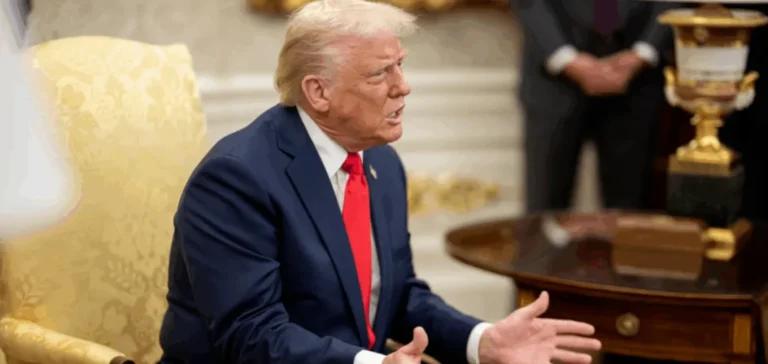U.S. President Donald Trump has declared his intention to impose 100% tariffs on countries that continue importing Russian oil unless Moscow agrees to a peace deal within 50 days. The threat, set to expire in early September, echoes a similar announcement made in March targeting buyers of Venezuelan crude, which has yet to result in concrete action.
Expected impact on global oil market balance
According to several analysts cited by Reuters, enforcing such a measure would be difficult without causing major instability in global energy markets. A strict application of these secondary sanctions could remove over 4.5 million barrels per day from the global supply, placing significant upward pressure on oil prices.
President Trump’s sensitivity to oil price fluctuations is well known. Two days after issuing the tariff threat, he stated that a barrel price of $64 was “a great level” and that his administration was seeking to lower it slightly to contain inflation. Since then, oil prices have remained in the $60 range, with no signs of immediate supply disruption.
Asian markets and sanctions circumvention
Indian refiners, among the main buyers of Russian crude, are not expecting a policy change and have taken no steps to reduce purchases, three industry sources said. Indian imports from Russia even rose by approximately 1% in the first half of the year, according to trade data, with Reliance Industries and Nayara Energy accounting for nearly half of these volumes.
China, Venezuela’s primary oil customer, has circumvented U.S. restrictions by importing over $1bn worth of rebranded crude under a Brazilian flag. This strategy, in place since the initial sanctions in 2019, enabled Venezuelan oil exports to increase in June despite the loss of Western buyers.
Regulatory uncertainty and congressional position
The U.S. Treasury Department has stated its readiness to implement sanctions should Russia fail to meet the administration’s conditions. However, the precedent of unfulfilled threats on Venezuelan oil contributes to market scepticism.
A U.S. Senate bill proposes a 500% tariff on Russian crude buyers, but it remains pending without a defined timeline. Even if passed, the legislation includes a waiver allowing the president to suspend its application, effectively limiting its scope.
Since the beginning of the year, the United States has sanctioned 19 Russian nationals under programmes mostly related to terrorism, cybersecurity, and North Korea, according to a former Treasury sanctions investigator. By comparison, 75 Iranian individuals and entities and 109 Chinese targets have been sanctioned in the same period.






















